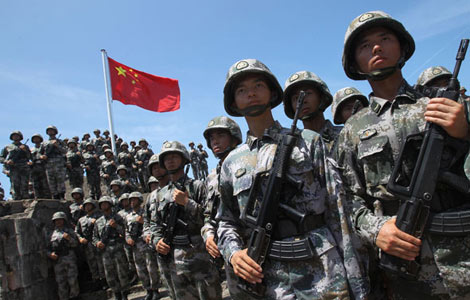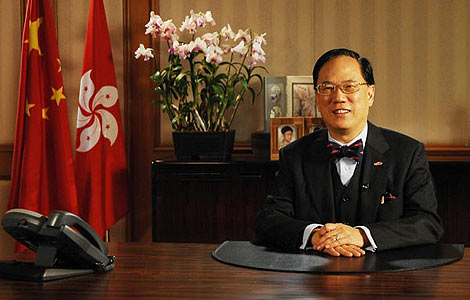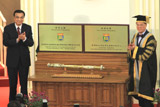

 In mapping out his vision for Hong Kong, Leung Chun-ying draws much of his inspiration from arguably the city's greatest rivals: London and New York.
In mapping out his vision for Hong Kong, Leung Chun-ying draws much of his inspiration from arguably the city's greatest rivals: London and New York.
Chinese President Hu Jintao will visit Hong Kong from June 29 to July 1 to attend the ceremony marking the 15th anniversary of Hong Kong's return to the motherland.
 The People's Liberation Army troops had been at the garrison for a month, following the return of Hong Kong to China on July 1, 1997, and many residents expected them to have a high-profile presence.
The People's Liberation Army troops had been at the garrison for a month, following the return of Hong Kong to China on July 1, 1997, and many residents expected them to have a high-profile presence.
 Past experiences have proved the principle of "one country, two systems" a unprecedented success, and "I profoundly believe in its better future," Tsang said.
Past experiences have proved the principle of "one country, two systems" a unprecedented success, and "I profoundly believe in its better future," Tsang said.
 HK's average GDP per capita has risen from $27,000 in 1997 to $34,200 in 2011 and the unemployment rate is 3.4% down from 8.7% during 2003 SARS outbreak.
HK's average GDP per capita has risen from $27,000 in 1997 to $34,200 in 2011 and the unemployment rate is 3.4% down from 8.7% during 2003 SARS outbreak.
The HK and the central governments should formulate more favorable fiscal policies to ease business difficulties faced by enterprises stationed in the Pearl River Delta region.
 With eight supplements signed from 2004 to 2011, the CEPA, broadening the scope of Hong Kong beneficiaries, provided wider and deeper openness of the mainland's market to the city's companies, especially in the service industry.
With eight supplements signed from 2004 to 2011, the CEPA, broadening the scope of Hong Kong beneficiaries, provided wider and deeper openness of the mainland's market to the city's companies, especially in the service industry.
In recent years, as the distinctions between Hong Kong and the mainland have become smaller, an increasing number of mainland students has opted to return to the mainland rather than to stay in the city.
Mainland wives of local men who migrated to Hong Kong on one-way permits are to be permitted to make bookings to have their babies at local private hospitals.
Hong Kong has been ranked the world's most competitive economy for the second consecutive year.
 Leung Chun-ying, newly-elected Chief Executive of the Hong Kong SAR said Hong Kong people's expectation is his obligation.
Leung Chun-ying, newly-elected Chief Executive of the Hong Kong SAR said Hong Kong people's expectation is his obligation.
 The central government will set up a dedicated fund to aid 1,000 HKU teachers and students to visit the mainland every year, starting in 2012.
The central government will set up a dedicated fund to aid 1,000 HKU teachers and students to visit the mainland every year, starting in 2012.